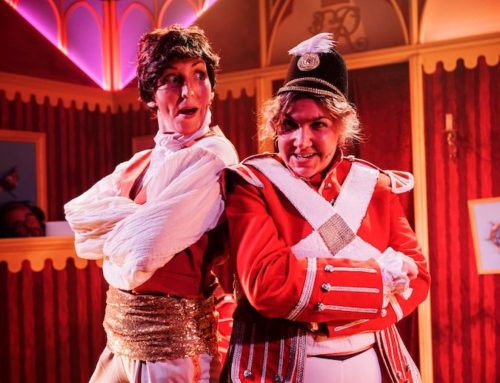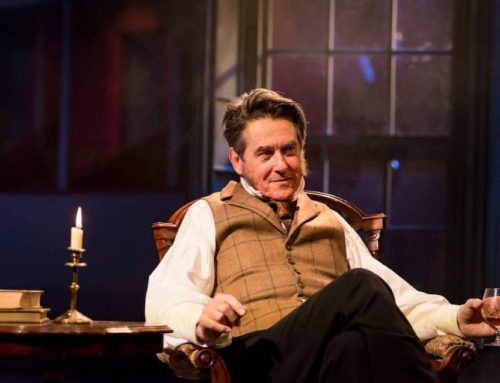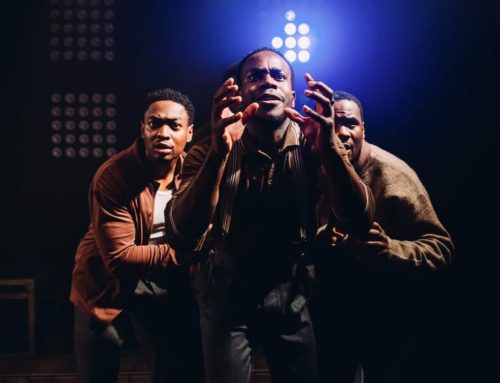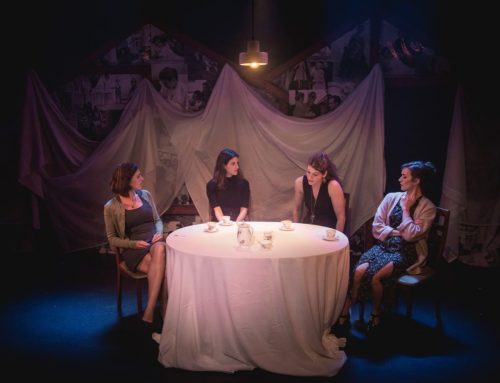In the three decades between 1925 and 1955 Welsh-born writer John Van Druten enjoyed significant if fleeting success as a purveyor of light comedy. His wartime-set romcom The Voice Of The Turtle, here revived enjoyably by director Philip Wilson, ran for close to 1600 performances on Broadway from 1943 onwards. A London production followed in 1947. Better remembered contemporary doyens of the well-made play Terence Rattigan and Somerset Maugham fell by the wayside with the coming of the Angry Young Men, before later re-evaluation. Van Druten fell between the cracks. It is a shame because watching The Voice Of The Turtle feels a little like sitting back in one of the scruffy but commodious armchairs set designer Ruari Murchison places centre-stage: predictably soothing to the soul if a little threadbare in parts.
A rainy New York, Spring 1943. Struggling early-20s actor Sally Middleton (Imogen Elliott) is learning Juliet’s lines for a Shakespeare production she hopes one day to be cast in. Following a recent break-up with a big-time musical producer boyfriend she frets over promiscuity (having had a grand total of two romances) and determines not to have sex again until she is 30. What are the chances Sally, whose “besetting sin” is talking too much, will meet a man to change her mind? Enter vampy fellow actor Olive Lashbrooke (Skye Hallam in blood-red bonnet, lips, and fingernails) whose male followers have been rather more copious. Olive specialises in playing “prostitutes” on stage. The character juxtaposition between Sally’s buttoned-up romanticism and Olive’s risqué raciness must have been spicy back in the day – here it screams period piece.
Olive has a date with erstwhile playboy now Army sergeant Bill Page (Nathan Ives-Moiba). Plot shenanigans see Olive get a better offer from a more senior officer, leaving Bill alone in Sally’s small, mid-town Manhattan studio. Bill is carrying his own long-standing grief over a failed dalliance with a woman in Paris. Outside it is pouring, the hotels are all full, and Bill’s friends are mostly out of town. In an act of kindness, a plot contrivance that really only makes sense in the context of wartime dislocation, Sally offers Bill the use of her spare bed. The two bond over cocktails and dinner. Romance beckons. Van Druten throws a few half-hearted obstacles in the couple’s path to love (Olive most definitely does not believe in “beau-snatching”) but the real antagonists here are Sally’s own up-tight morality and Bill’s reluctance to get hurt again.
Van Druten’s offers little by way of narrative – six scenes over three days all set in Sally’s apartment – which means the characterisation here has to carry the weight of the play. Elliott’s Sally offers up a mix of midwestern sincerity and self-doubt, one that hints at hidden fiery desires and just about carries off some of the more unlikely dialogue. “I rouse the beast in you” she tells a smouldering Bill and then continues with menacing honesty “… there is a beast in me too”. Sally is the centre of the play, and one senses Van Druten wants to celebrate her sexual independence and agency over her life. But for whatever reason he cannot quite see it through; “I wish I’d started housekeeping being rationing came in” she tells us as she fusses around the apartment and cleans up after Bill. A proto feminist she is not.
Hallam plays “gullible Gertie” Olive mostly for laughs, particularly in the second half, but sensibly eschews the temptation to make her a gossipy termagant. Like Sally she is doing her best to get by, looking for love in all the wrong places and getting hurt along the way. Hallam brings empathy to her search. “I never knew men could be such bitches” she tells us towards the end, and you cannot help but sympathise.
Ives-Moiba’s brings charisma to Bill and builds an easy, likeable chemistry with Elliot’s Sally. In the end can one really believe in the dishy playboy sergeant who quotes Milton by heart, cooks, and likes the finer things in life? Opinions will vary. Like Terence Rattigan and Somerset Maugham, Van Druten was a gay man in dark decades when homosexuality was criminal. Each communicates gay experiences in their work beneath a facade of socially acceptable, heterosexual love. One suspects a little bit of wish fulfilment in the smouldering soldier.
Comforting, witty, predictable, and kind. They don’t write them like this anymore.
Writer: John Van Druten
Director: Philip Wilson
More Recent Reviews
Milked. White Bear Theatre.
Written in 2013 and first seen a decade ago in a production at the Soho Theatre, Simon Longman’s slice [...]
Fresh Mountain Air. Drayton Arms Theatre.
Lana Del Rey’s ode to female unity and resilience, God Bless America And All the Beautiful Women In It, [...]
Rodney Black: Who Cares? It’s Working. Lion and Unicorn Theatre.
Rodney Black is a tacky small-time comedian with a venal manager and a taste for nasty misogynism. “I’m a [...]






